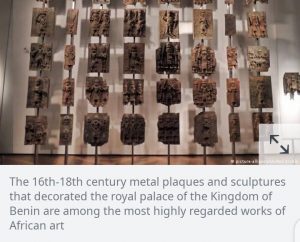German cultural and political leaders have reached a deal to return the artefacts to Nigeria next year.
The ancient artworks were plundered in the 19th century and are currently on display in German museums.
Germany plans to hand back ancient, pillaged artefacts known as the Benin Bronzes to Nigeria next year, after museum experts and political leaders struck an agreement on Thursday.
Most of the artefacts were looted by British forces during a military expedition to the kingdom, in what is now Nigeria, in 1897.
The 16th-18th century metal plaques and sculptures that decorated the royal palace of the Kingdom of Benin are among the most highly regarded works of African art.
They are now scattered around European museums.
After the decision on Thursday, the next step will be to develop a road map for the return, which should be completed in the next few months.
That will mean inventorying all the items by June 15, followed by a meeting on June 29 to consider the best approach.
The 16th-18th century metal plaques and sculptures that decorated the royal palace of the Kingdom of Benin are among the most highly regarded works of African art
Germany puts museum cooperation with Africa on agenda
German Foreign Minister Heiko Maas called the agreement “a turning point in our approach to colonial history.”
“We have been working intensively for months to create the framework conditions for this,” he said, adding: “We have put the issue of museum cooperation with Africa on the political agenda and sought dialogue with our Nigerian partners, the architect and the initiators of the Benin Museum.”
“From archaeological cooperation to the training of museum managers and assistance with cultural infrastructure, we have put together a package and are continuing to work on it with our Nigerian partners.”
With this decision, Culture Minister Monika Gruetters said, “We want to contribute to understanding and reconciliation with the descendants of those whose cultural treasures were stolen during colonization.”
Debate over Benin bronzes gains momentum in Germany Hermann Parzinger of the Prussian Cultural Heritage Foundation said the goal is to return the first items by 2022. He said talks are planned with the group’s Nigerian counterparts to ensure “substantial returns and future cooperation.”
Those would include talks about allowing some of the items to remain on display in German museums.
The famous bronzes are to be found in a number of German museums. The Berlin Ethnological Museum holds around 530 artefacts from the kingdom of Benin, including around 440 bronzes.
Some 180 of the bronzes are due to be exhibited this year in Berlin’s Humboldt Forum, a new museum complex that opened in December.
Pressure on former colonial powers to return looted artworks
Most European former colonial powers have begun a process in recent years of considering the return of looted artefacts to the former colonies, especially in Africa.

The famous bronzes are to be found in a number of German museums
Last month, the University of Aberdeen in Scotland agreed to return a Benin Bronze sculpture to Nigeria, saying it was acquired by British soldiers in 1897 in “reprehensible circumstances.”
That decision raised pressure on other establishments, including the British Museum, to follow suit.
The British Museum is reportedly considering lending its Bronzes to Nigeria.
Nigeria plans to build a museum in Benin city to house the looted artefacts after they are returned, a €3.4 million scheme in which the British museum will participate.
Late last year, France approved the restitution of 26 items from the Kingdom of Benin pillaged in 1892.
Credit: dw


